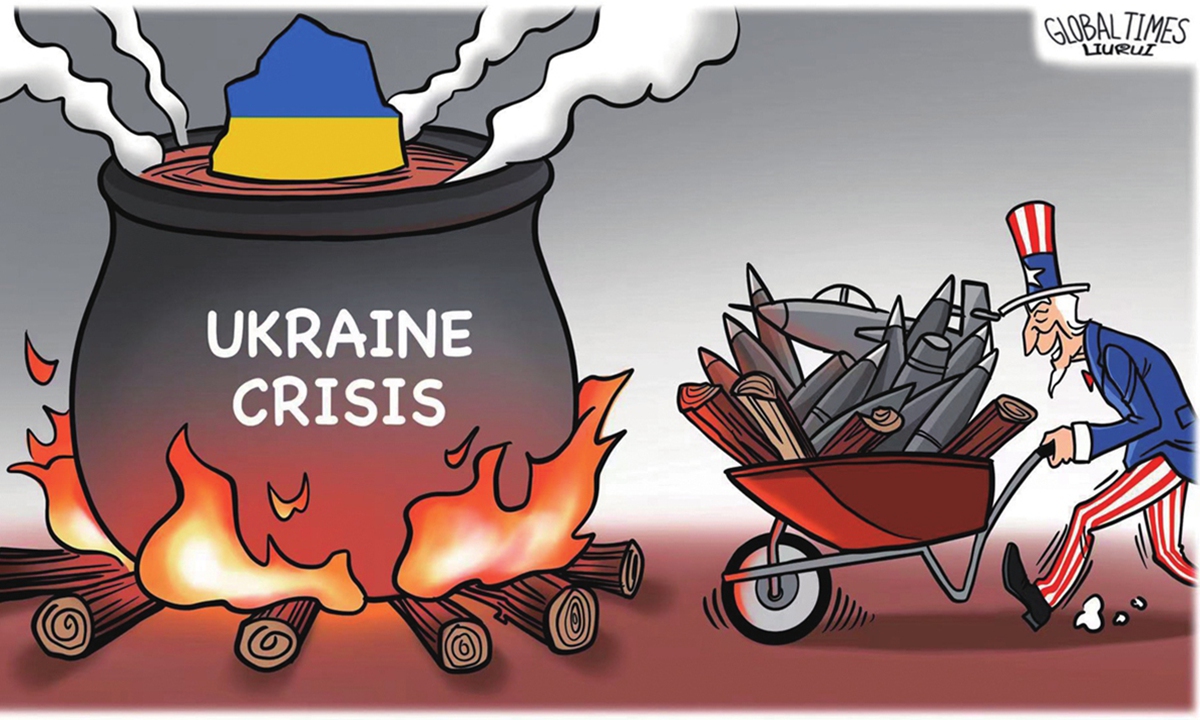
US Ukraine crisis Illustration: Liu Rui/GT
China will decide independently whether or not to attend particular summits according to its own position, China's top diplomat Wang Yi said on Tuesday, while elaborating on China's consistent position on the Ukraine crisis and stressing China will never stop its efforts for peace.
Chinese experts pushed back against criticism from some Western countries regarding China's decision not to participate in the Switzerland conference. Experts argue that these countries are attempting to morally abduct China and tarnish its reputation. Some Western countries are only participating in the conference to assert their relevance and advance their own interests in the Russia-Ukraine conflict. In contrast, China's commitment to justice and collaboration with Global South nations to promote peace has garnered international recognition, they noted.
"There are many summits in the world today. Whether and how to participate, China will decide independently according to its own position," Wang, Chinese Foreign Minister and a member of the Political Bureau of the Communist Party of China Central Committee, said in Beijing on Tuesday when he met the press together with Turkish Foreign Minister Hakan Fidan.
Wang stressed that China adheres to promoting talks for peace, and although the conditions for peace talks are not yet in place, China will never stop its efforts for peace.
China attaches importance to Switzerland's work for the preparation to the Summit on Peace in Ukraine, and has put forward constructive suggestions to the Swiss side on many occasions, for which the Swiss side has always given positive comments and thanks.
China
confirmed last week that it would not attend the Ukraine peace conference in Switzerland scheduled in mid-June, as the meeting falls short of China's requests, according to Chinese Ministry of Foreign Affairs spokesperson Mao Ning.
Some Western countries and organizations have been exerting pressure on China since Beijing announced its decision.
In the latest case, NATO Secretary General Jens Stoltenberg has criticized China for "boycotting" Switzerland's conference, media reported.
Japanese Foreign Minister Yoko Kamikawa said on Tuesday that it is "regrettable" China is not participating the conference in Switzerland, Kyodo News reported.
"If the Summit had invited all parties directly involved in the conflict, China would be more than happy to attend. However, the problem is the host and Western countries snubbed Russia first, which makes participation in this conference pointless," Cui Heng, a scholar from the Shanghai-based China National Institute for Shanghai Cooperation Organization International Exchange and Judicial Cooperation, told the Global Times on Wednesday.
The Swiss government sent out 160 invitations to the summit, Swiss President Viola Amherd said on May 15, according to Reuters. Russia was not invited.
In fact, some Western countries are attending the Switzerland conference just to validate their existence, and it is unlikely these countries can offer feasible solutions to solve the Russia-Ukraine conflict at the conference, said Zhang Hong, an associate research fellow at the Institute of Russian, Eastern European and Central Asian Studies of the Chinese Academy of Social Sciences.
Zhang noted that without Russia's participation, some Western countries are likely to use the Switzerland conference as a platform to promote their own selfish agendas on the Ukraine crisis.
Cui believes those Western politician's criticism against China's non-participation is tantamount to moral abduction. "If China attends, they will say China's relationship with Russia has changed; when China doesn't attend, they say China has not fulfilled its obligation… Our proposition for a peace summit is that it should be inclusive, not exclusive, and the summit in Switzerland doesn't fit our proposition."
While India is expected to attend the Switzerland conference, New Delhi will not be represented by top leaders, including the prime minister or external affairs minister, people familiar with the matter told the Hindustan Times on condition of anonymity.
Continued effort Chinese Vice Foreign Minister Sun Weidong and Ukraine's First Deputy Foreign Minister Andriy Sybiha exchanged views over the Ukraine crisis as well as international and regional issues of common concern on Wednesday in Beijing.
Last month, China and Brazil jointly issued the
"Common Understandings Between China and Brazil on Political Settlement of the Ukraine Crisis."In just one week, 45 countries from five continents responded positively to the "six common understandings" in different ways, of which 26 countries have confirmed their accession or are seriously studying the way of accession. Russia and Ukraine also affirmed most of the contents of these six common understandings, Wang said Tuesday.
This once again illustrates that these six common understandings meet the common expectations of the majority of countries, Wang said.
Fidan also told Wang that Turkey highly appreciates China's fair and just position on issues such as Ukraine and the Middle East.
Wang Yi also met with Venezuela's Foreign Minister Yvan Gil Pinto in Beijing on Wednesday. Pinto said Venezuela also appreciates the six-point consensus on the political resolution of the Ukraine crisis jointly issued by China and Brazil.
Venezuela appreciates China's commitment to fairness and justice in international affairs and is willing to closely communicate and cooperate with China to promote the continuous development of China-Latin America relations, jointly uphold multilateralism and the principles of the UN Charter, jointly oppose hegemony and unilateral illegal sanctions, and defend the common interests and fairness and justice of the Global South, Pinto said.
The "Common Understandings" between China and Brazil are an in-depth explanation of China's stance on promoting peace talks between Russia and Ukraine, Cui said. What is more important is that it was issued by both China and Brazil, representing the common stance of non-Western countries. This is why it was supported by a wide range of nations internationally.
Zhang believes that right now the condition is not ripe for Russia and Ukraine to sit down for peace talks. However, China will continue to make efforts in promoting peace and patiently wait for the right opportunity to advance peace talks.




